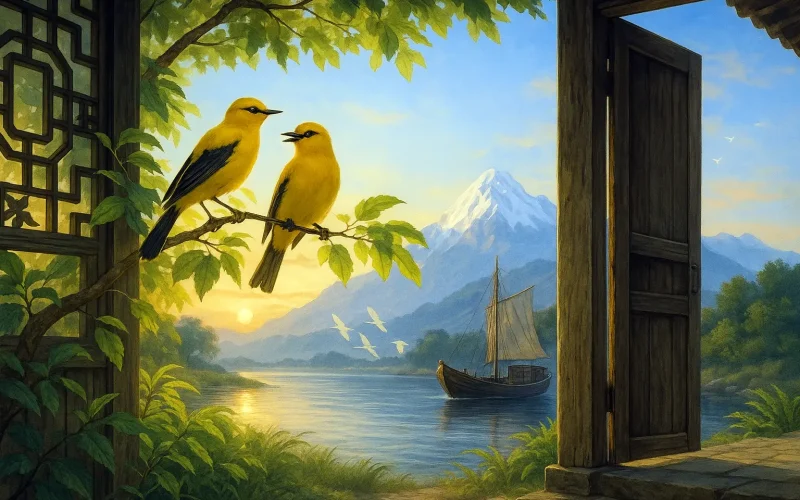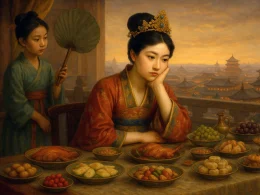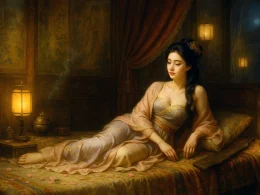Two golden orioles sing amid the willows green;
A flock of white egrets fly into the blue sky.
My window frames the snow-crowned western mountain scene;
My door off says to eastward going ships "Goodbye!"
Original Poem
「绝句四首 · 其三」
杜甫
两个黄鹂鸣翠柳,一行白鹭上青天。
窗含西岭千秋雪,门泊东吴万里船。
Interpretation
This widely celebrated poem was composed by Du Fu in the spring of 764 CE, the second year of the Guangde era under Emperor Daizong, during his residence at the thatched cottage by the Huanhua Stream in Chengdu. Although the An Lushan Rebellion had been suppressed, the separatist power of regional warlords continued unabated, and societal unrest remained. After years of displacement, the poet had found a temporary dwelling here, his state of mind revealing a moment of quiet respite amidst enduring hardship. The spring scene viewed from his cottage window reflects not only his acute sensitivity to the vitality of nature but also carries his profound contemplation of the shifting times and his quiet longing for a homeland a thousand miles distant.
First Couplet: “两个黄鹂鸣翠柳,一行白鹭上青天。”
Liǎng gè huánglí míng cuì liǔ, yī háng báilù shàng qīng tiān.
Two golden orioles sing in the emerald willows, a lively air; / A line of snowy egrets climbs into the azure sky, ascending there.
The poet opens with a couplet crafted with the precision of fine brushwork, constructing a multi-dimensional spring scene rich in vertical and horizontal, distant and proximate, and dynamic contrasts. "Two" parallels "a line"—specific numerals that are nonetheless vivid and evocative. "Golden orioles" pairs with "snowy egrets"; "emerald willows" with "azure sky"—vibrant colors set in mutual resonance, resembling a fresh, luminous painting pulsating with life. The nearby, joyful singing of the orioles embodies the clamor and delight of spring; the orderly, distant flight of the egrets suggests an atmosphere of openness and serenity. The verbs "sing" and "climbs" lend the tableau an auditory liveliness and a dynamic sense of soaring elevation, instantly transporting the reader into that bright, animated spring moment outside the cottage.
Second Couplet: “窗含西岭千秋雪,门泊东吴万里船。”
Chuāng hán xī lǐng qiān qiū xuě, mén bó dōng wú wàn lǐ chuán.
My window frames the western hills' agelong crests of snow; / Moor'd at my gate, from Eastern Wu, the ships of long ago.
The gaze extends from the near to the far, shifting from an upward glance to a level contemplation; the artistic conception transitions from bright clarity to expansive depth. The phrase "my window frames" is remarkably potent. The poet captures the distant, snow-capped peaks within the window's bounds, transforming a natural vista into a composed painting, an act of subjective framing and projection of his inner world. "Aglong crests of snow" condenses the weight and permanence of time, evoking stillness and solemnity. "Moor'd at my gate" forms a parallel structure, introducing human activity and distant lands. "The ships of long ago" refers not merely to vast geographical distance but also subtly suggests signs of restored travel and commerce—hints of stability that bear the poet's hopes for peaceful times and the latent possibility of returning home. One verb suggests containment and stillness ("frames"), the other a poised readiness ("moor'd"); one points to eternity, the other to connection and flow. Together, they crystallize the poet's spiritual realm, where his body resides in a modest room while his mind wanders ten thousand miles.
Holistic Appreciation
The poem’s four lines function like four discrete yet sequentially connected shots, collectively forming a concise spiritual film set in the light of spring. The first two lines focus on the vivid creatures in the courtyard before the window—their colors fresh, their vitality abundant. The latter two expand to the vast scenery of distant mountains and the riverside—the conception is expansive, the emotion profound and far-reaching. The entire poem depicts scenery without a single word directly expressing feeling; yet emotion is deeply embedded within the imagery. The delight of the orioles and egrets is the transient joy of finding peace amidst chaos; the permanence of the western hills' snow implies a reverence for history and nature; the distance of the ships from Wu carries a profound gaze toward peaceful life and the path of homecoming.
Du Fu uses poetry as painting, yet transcends mere pictorial art. Within a small frame, he composes the scene; within twenty-eight characters, he encompasses dimensions of time and space. He weaves together personal, present tranquility, nature's eternal quiet beauty, and the latent hopes of his era into a spring scroll richly layered with emotion and enduring in its subtle, profound conception. This is not merely the poet's faithful record of the scenery surrounding his cottage, but the spiritual journey and inner reconciliation accomplished at his spring window by a poet profoundly acquainted with sorrow.
Artistic Merits
- Exquisite Parallelism, Naturally Pictorial
Both couplets form perfectly parallel structures. Numbers, colors, creatures, and scenery correspond precisely—meticulous yet natural. The four lines resemble four painted panels, individually presenting nearby singing birds, egrets in flight, distant snowy peaks, and moored ships by the river. Each image is self-contained yet resonates with the others, cohering into a harmonious, holistic artistic conception. - Color and Composition with Distinct Layers
The poet skillfully employs color terms: "golden," "emerald," "snowy," "azure," supplemented by the implied white of "snow" and the suggested darker hues of the "ships," creating vivid contrasts and harmonious interplay. The composition of the first two lines is lively and ascendant; the latter two are steady and horizontally expansive, resulting in exceptionally rich visual stratification. - Vast Worlds Within Small Views, Miles Within Inches
From the "two golden orioles" in the willows by the window to the "ships" from a land "of long ago," the poet, through visual leaps and the juxtaposition of imagery, expands a tremendous sense of spatial and historical depth within the compact quatrain form. This embodies the classical Chinese aesthetic spirit of conveying vastness within minimal bounds. - Precise Diction with Profound Resonance
The word "frames" grants the window an active sense of selecting and containing, making nature a component of the poet's mental landscape. "Moor'd" suggests stillness pregnant with potential movement, hinting at journey and hope. Both are ordinary words, yet they are laden with deep emotion and the imprint of their era, demonstrating Du Fu's relentless dedication to the craft of language.
Insights
This short poem demonstrates a wisdom of living and a poetic vision: "to perceive the cosmos within a square inch." Dwelling in his cottage, Du Fu's eyes beheld only an ordinary spring scene. Yet, within the orioles and egrets, he perceived vitality; in the western hills' snow, he sensed eternity; upon the ships moored beyond his gate, he projected his distant thoughts. It teaches us that the realm of the spirit is never confined by physical space. Even amidst hardship or the mundane, maintaining mental clarity and emotional richness allows one to discover poetry in the daily and to connect with the infinite from within the finite.
Furthermore, that "ship from Eastern Wu" moored at the gate is not merely a geographical vessel but a symbol traversing the storms of life, sailing toward hope and homecoming. It reminds us that however many "agelong" years of hardship, like enduring snow, we may endure, we can still preserve within our hearts a warm anticipation for connection, for distant shores, for reunion. This is precisely the resilient and luminous attitude toward life that Du Fu, from his age of turmoil, bequeaths to us.
Poem translator
Xu Yuanchong (许渊冲)
About the poet

Du Fu (杜甫), 712 - 770 AD, was a great poet of the Tang Dynasty, known as the "Sage of Poetry". Born into a declining bureaucratic family, Du Fu had a rough life, and his turbulent and dislocated life made him keenly aware of the plight of the masses. Therefore, his poems were always closely related to the current affairs, reflecting the social life of that era in a more comprehensive way, with profound thoughts and a broad realm. In his poetic art, he was able to combine many styles, forming a unique style of "profound and thick", and becoming a great realist poet in the history of China.












